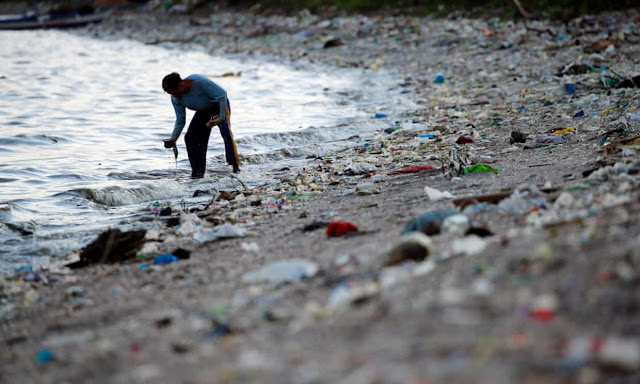A man collects recyclable materials along Manila Bay, Philippines. A case against the country’s government could set an important precedent. Photograph: Francis R Malasig/EPA
A series of lawsuits against plastic producers and governments is expected after a “historic” international agreement on waste, say legal experts.
Last week, world leaders agreed to draw up a legally binding treaty over the next two years that covered the full lifecycle of plastics from production to disposal. The move was described by the head of the UN Environment Programme as the most important multilateral environmental deal since the Paris agreement in 2015.
And, like its climate counterpart, the new treaty could provide an essential tool to hold governments and companies accountable for their environmental impacts.
An imminent case in the Philippines could set an important precedent. Last year, a coalition of individuals and environmental groups led by the marine conservation group Oceana Philippines filed a petition accusing the Philippine government of failing to tackle the “unabated production, use and disposal of plastic” over the past two decades.
The group claims a law requiring the country’s public waste body to review, update and enforce a list of products that are not environmentally friendly has never been implemented despite being passed in 2001. The result of this, it say, is “the unabated emission of millions of tons of plastic waste into every nook and cranny of the Philippine archipelago”.
The petitioners, who include people who are catching fewer fish, having trouble conceiving or being affected by worsening floods aggravated by plastic pollution, say the government’s inaction is breaching their constitutional right to a healthy environment.
The Philippine supreme court has accepted the case, which goes to trial later this month.
Carroll Muffett, the president of the US-based Center for International Environmental Law, said it was “beyond any doubt” there would be more lawsuits on plastics in future, pointing to the “small but accelerating” body of litigation already in North America.
The coffee company Keurig Green Mountain recently agreed settlements in both the US and Canada with a consumer and regulator respectively after being challenged on claims about the recyclability of its disposable coffee pods. The company paid out millions of dollars and has to change the language it uses on its packaging.
Earth Island Institute, a California-based environmental group, has filed three separate lawsuits against producers of plastic goods. In 2020, it began suing Coca-Cola, Pepsi, Nestlé and other large companies for creating a plastic pollution “nuisance”.
Last week, world leaders agreed to draw up a legally binding treaty over the next two years that covered the full lifecycle of plastics from production to disposal. The move was described by the head of the UN Environment Programme as the most important multilateral environmental deal since the Paris agreement in 2015.
And, like its climate counterpart, the new treaty could provide an essential tool to hold governments and companies accountable for their environmental impacts.
An imminent case in the Philippines could set an important precedent. Last year, a coalition of individuals and environmental groups led by the marine conservation group Oceana Philippines filed a petition accusing the Philippine government of failing to tackle the “unabated production, use and disposal of plastic” over the past two decades.
The group claims a law requiring the country’s public waste body to review, update and enforce a list of products that are not environmentally friendly has never been implemented despite being passed in 2001. The result of this, it say, is “the unabated emission of millions of tons of plastic waste into every nook and cranny of the Philippine archipelago”.
The petitioners, who include people who are catching fewer fish, having trouble conceiving or being affected by worsening floods aggravated by plastic pollution, say the government’s inaction is breaching their constitutional right to a healthy environment.
The Philippine supreme court has accepted the case, which goes to trial later this month.
Carroll Muffett, the president of the US-based Center for International Environmental Law, said it was “beyond any doubt” there would be more lawsuits on plastics in future, pointing to the “small but accelerating” body of litigation already in North America.
The coffee company Keurig Green Mountain recently agreed settlements in both the US and Canada with a consumer and regulator respectively after being challenged on claims about the recyclability of its disposable coffee pods. The company paid out millions of dollars and has to change the language it uses on its packaging.
Earth Island Institute, a California-based environmental group, has filed three separate lawsuits against producers of plastic goods. In 2020, it began suing Coca-Cola, Pepsi, Nestlé and other large companies for creating a plastic pollution “nuisance”.
The following year Earth Island Institute brought another lawsuit against Coke as well as BlueTriton Brands (formerly Nestlé Waters North America), claiming the companies falsely portrayed themselves as environmentally friendly despite being huge plastic polluters.

No comments:
Post a Comment